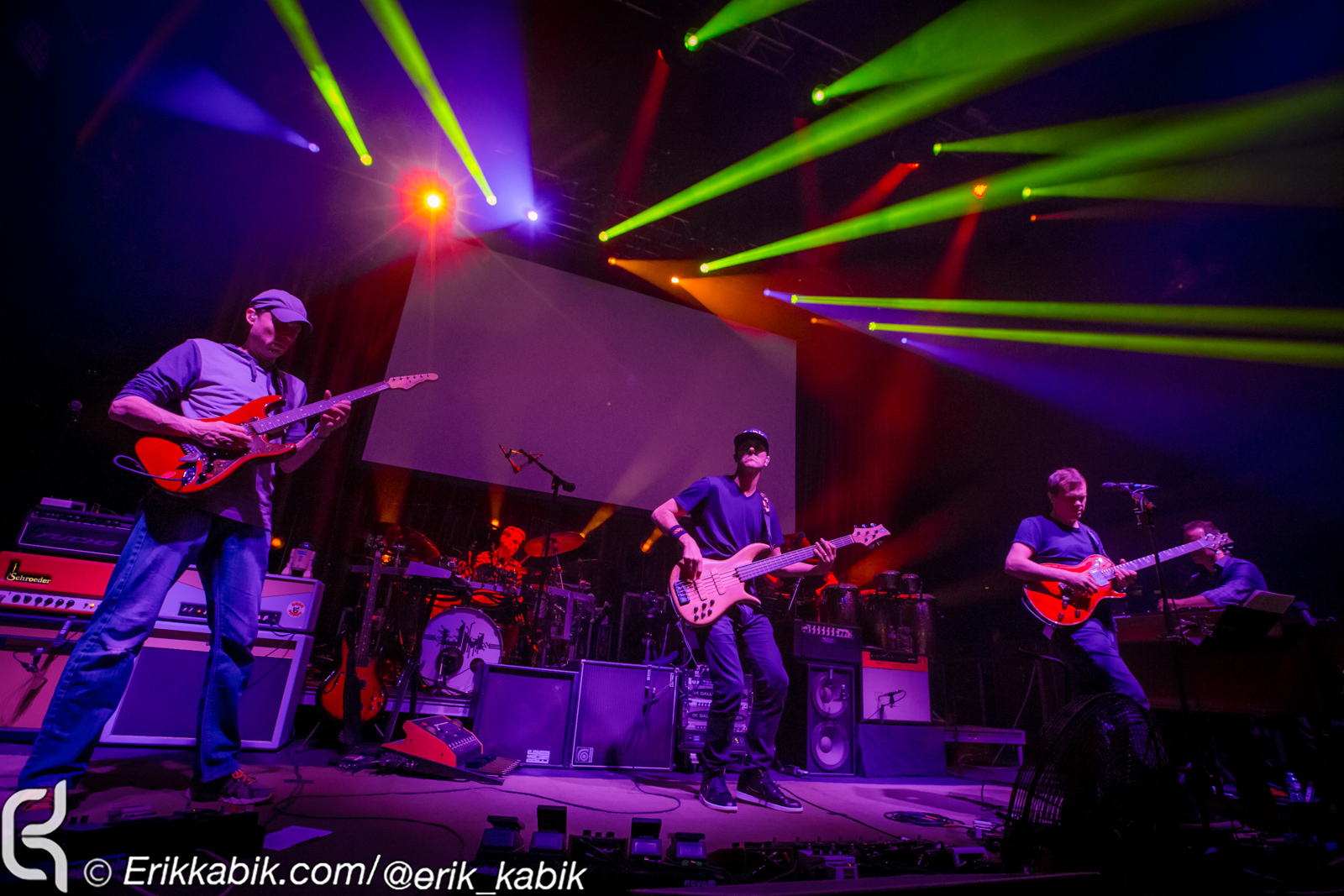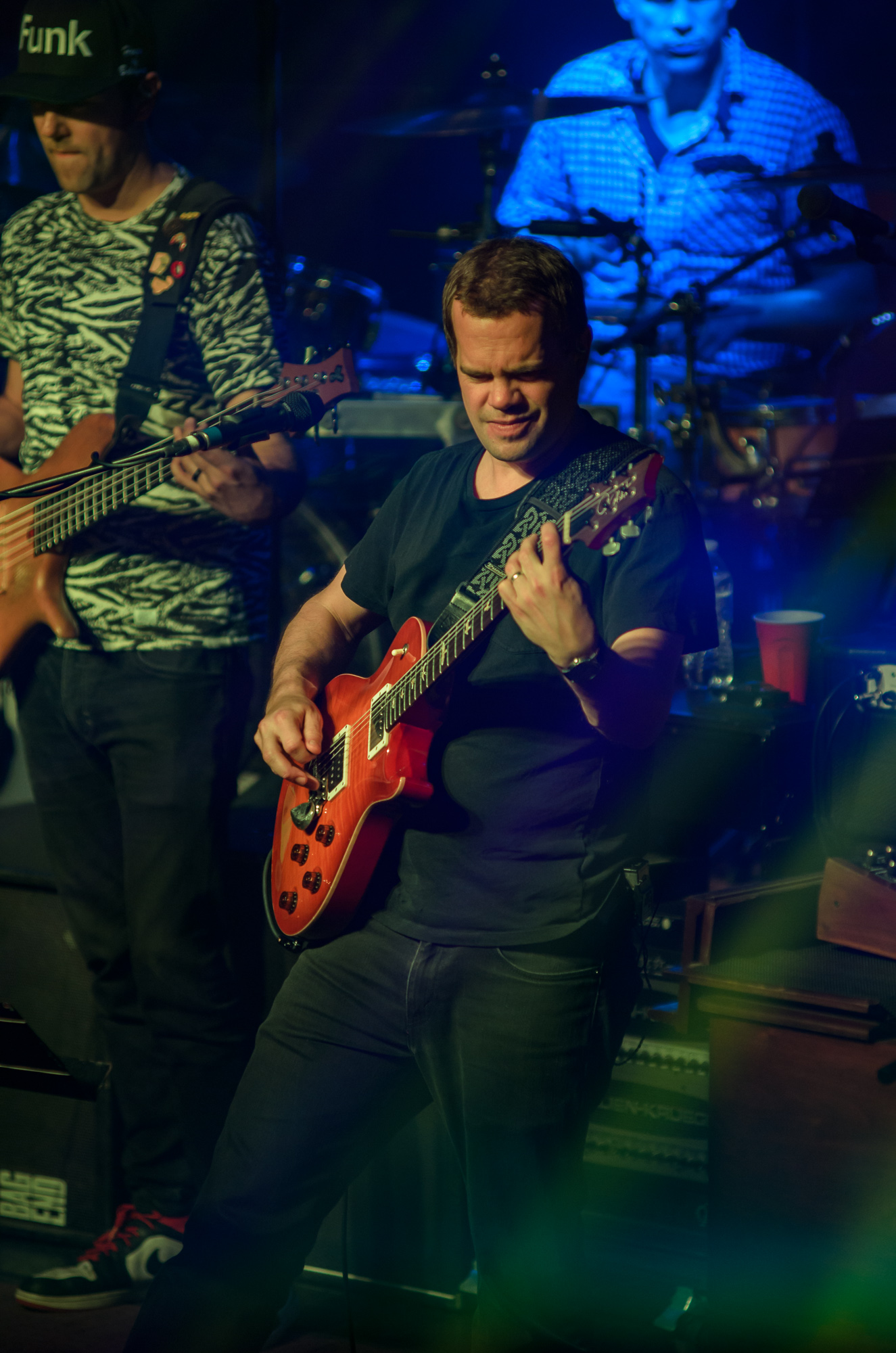Track By Track: Umphrey’s McGee’s ‘Zonkey’
 On Oct. 31, 2008, at The Warfield in San Francisco, Umphrey’s McGee debuted a series of mash-ups that have come to define the group’s Halloween performances. As guitarist Brendan Bayliss recalls, “There was a DJ [Zebra] who did ‘Come Together’ by The Beatles with ‘Come Closer’ by Nine Inch Nails. We were on the bus and I think it was [bassist Ryan] Stasik who said: ‘Why don’t we learn this and play it tonight?’ We did it [on 2/13/08 at Crash Mansion in Los Angeles] and later, when we needed something for Halloween, we said, ‘Why don’t we just do our own mash-ups and we’ll have a costume theme tied into it?’ So we did ‘Another Brick in the Wall’ with ‘Thriller’ and that started the whole thing from there.”
On Oct. 31, 2008, at The Warfield in San Francisco, Umphrey’s McGee debuted a series of mash-ups that have come to define the group’s Halloween performances. As guitarist Brendan Bayliss recalls, “There was a DJ [Zebra] who did ‘Come Together’ by The Beatles with ‘Come Closer’ by Nine Inch Nails. We were on the bus and I think it was [bassist Ryan] Stasik who said: ‘Why don’t we learn this and play it tonight?’ We did it [on 2/13/08 at Crash Mansion in Los Angeles] and later, when we needed something for Halloween, we said, ‘Why don’t we just do our own mash-ups and we’ll have a costume theme tied into it?’ So we did ‘Another Brick in the Wall’ with ‘Thriller’ and that started the whole thing from there.”
Umphrey’s has now collected a dozen of their favorite mash-ups on their new album, Zonkey. The band recorded new versions of these songs in the studio, using their live performances as reference points. “We started with a live version and Kris [Myers] went into the studio and played a real drum take to that version. Then, once we got the drum take, we went in and layered everything else,” Bayliss explains.
As for how long it originally took the band to learn the material on Zonkey, he says, “It depends. It’s hard when you get six cooks in a kitchen. There’s a lot of opinions—‘Let’s try this, let’s not try this,’ and we tend to have a ‘Let’s try something before we say no’ policy, so it takes a long time. For the ones that I would come up with, I’d make a chart on my own and I would show up to rehearsal and say, ‘Let’s try it like this,’ to eliminate a lot of the political correctness of saying yes to every idea. Sometimes, if we just have some song ideas with no form or structure to start with, we sit in a room and then it takes a while to just come up with a chart for an idea that we can then take to soundcheck to see if it’ll feel good.”
When it comes to naming the results, Bayliss discloses, “That’s when I step out of the process because I don’t really care that much what the song is called; I care how it sounds. Joel [Cummins] really gets into that. He has come up with the names for most of them. Sometimes Joel will make a master list and he’ll send an email out so that if anyone feels strongly about something, they’ll respond. But Joel spearheads naming them, unless they’re so obvious that they name themselves, like, ‘Come as Your Kids.’” 
The release of Zonkey finds the band in a legal gray area where it comes to clearing the publishing rights for the music. “There’s no precedent for something like this,” Bayliss acknowledges. “Technically, we’re performing the songs ourselves and we’re doing different lyrics, so [manager] Kevin Browning did a lot of research. He said he talked to six or seven different lawyers and got six or seven different answers. We had a meeting and we said there’s a chance we could get sued for this, so we thought about calling the album Let’s Get Sued.
“We sent a letter to every publishing company—it’s weird because Michael Jackson’s royalty rate is different than Frankie Goes to Hollywood’s. The royalty rate, say, for a song with Michael Jackson and Pink Floyd, is going to cost more than one with Rob Zombie. So, we contacted every publisher for every song and wrote them a letter, telling them what we were planning on doing. Then, we wrote everybody the initial check for, like, 41 cents a track. We’d actually lose money on some of these songs, if we sold them on iTunes, because of what we’re paying in royalties. So, basically, we’re assuming that we’re showing enough good faith by contacting the publishers and writing the initial check. If anyone has a real problem with it they can write a C&D [cease and desist] letter, and we haven’t received anything. We’re hoping that, by going through the normal process of paying royalty rates, we’ve covered our asses. But we don’t know, so I guess we’re going to find out.
“I remember, at one point, right when we were almost done with it, I brought up, ‘You know, guys, we have a really good thing going—we’re all happy, is this worth the risk? What if this is a huge mistake?’ Everybody kind of weighed the pros and cons. What’s scary is my mother-in-law is a judge and she asked me a couple questions I did not have answers for. So she basically said if someone wants to take us to court, then it all depends on the judge, on their interpretation of the law. I worry about the Zappa estate and maybe Pink Floyd and Bob Marley. I would think that James Hetfield would think it’s kind of funny and Kris did a good job emulating him.”
Whatever ensues—and one has to hail the band’s willingness to move forward, given the slightly fuzzy legal landscape, with such a commitment to the creative side, after pursuing due diligence and committing to fair royalties—Zonkey will commemorate the end of an era for the group. After the band’s Halloween run in St. Louis this year, they plan on retiring the mash-up tradition, or at least put it in mothballs. Bayliss affirms, “We’re going to do the record release, do the last Halloween mash-up, then put it to bed for a while and try to come up with something new.”
“NATIONAL LOSER ANTHEM” “National Anthem” (Radiohead) + “Loser” (Beck) + “In the Air Tonight” (Phil Collins)
I came up with the idea of “National Anthem” with “Loser.” A lot of it is trying to find songs that are similar in key and tempo, and both “Loser” and “National Anthem” are basically [in] D the whole time. There’s no key change. So when you put them on top of each other, it’s really easy to sing one over the other. I didn’t realize, but the basslines are very similar, too. Then, once we got into a room and started playing one and singing the other, Kris Myers just did the most famous drum solo of all time, and once he did that, we said, “Yeah, we should probably put that song in, too.” So that really just kind of happened, the third addition, which put it over the top.
“LIFE DURING EXODUS” “Life During Wartime” (Talking Heads) + “Exodus” (Bob Marley) + “City of Tiny Lites” (Frank Zappa) + “25 or 6 to 4” (Chicago)
Joel brought the idea to table and I didn’t hear it— I thought it was a stretch. I also thought it was weird to have a bunch of white guys from the Midwest sing “Exodus.” That was probably where my initial hesitation came in.
He said, “Trust me on this,” and he started playing the “Life During Wartime” verse and asked me to start singing Bob Marley over it. Once I did, it was pretty obvious that it was awesome. I very rarely will admit when I’m wrong, and that’s a time where I had to admit I was wrong. It turned into one of our better ones.
The initial idea was just those two and then, when we were charting it out, Jake [Cinninger] or Kris suggested “City of Tiny Lites” just because it’s the same key, same tempo, and it fit. And then I think the Chicago “25 or 6 to 4”—we didn’t talk about that. We played it live and we decided to open that part up. Jake started teasing the Chicago riff. So the version we picked had the Chicago tease in it.
“CAN’T ROCK MY DREAM FACE” “Rock With You” (Michael Jackson) + “Can’t Feel My Face” (The Weeknd) + “Dreams” (Fleetwood Mac)
Stasik really wanted to do something with “Can’t Feel My Face” because he said, “It’s going to be a dance party, chicks dig it and it’s current.” But then when it came time to do it, he didn’t have anything else to go with it, so I started listening and I threw out Fleetwood Mac and Michael Jackson, and everyone said, “Let’s do all three.” It happened pretty easily.
For me, when someone has an idea for a song they want to do, I usually will go to Spotify or even scroll through song titles on the Billboard top hits of 1990s until something jumps out that seems like it’ll fit. For some of these, I even dug out one of those old, archaic iPods that weighs 15 pounds and scrolled through. Like for the White Zombie one [“Thunder Kiss ‘65” which appears in “Frankie Zombie”], I dug through an iPod and that was the second to last artist. So it took a while to get there, but I got there.
“SAD CLINT EASTWOOD” “Sad But True” (Metallica) + “Clint Eastwood” (Gorillaz)
That’s another idea of mine where I thought that the “Sad But True” riff was awesome, but it’s in D, so I was looking for something in E so we didn’t have to detune every time we did it. I was going through an iPod, and I came across the Gorillaz. It seemed pretty obvious to me, but some of the other guys were kind of hesitant about it. Then, once we started playing that Metallica riff, it was almost funny. Once I saw the guys laughing at the idea, I knew it was gonna work, especially when Stasik started singing it. I was like, “Done.”
“ELECTRIC AVENUE TO HELL” “Highway to Hell” (AC/DC) + “Electric Avenue” (Eddy Grant) + “The Triple Wide” (Umphrey’s McGee)
This was another idea of mine that was met with some pushback because some of these are so distant from each other. When you think Eddy Grant, you don’t think Angus Young. I don’t know if we even had to change the key—they’re pretty close and the tempos are the same. The first time we played it, the crowd just went bonkers, so that’s the last piece, even if we’re kind of doubtful of something. If it goes over well, then it’s all good.
It’s weird when we go to a college campus and play a Huey Lewis song and some kids are looking at us like, “What the hell is this?” because they’ve never heard it. We think it’s awesome because we grew up listening to that music. So I could see how Eddy Grant might be something like that, but there’s something about that song—I don’t know if it’s been in commercials or on summer playlists—I think people are familiar with it.
“ACE OF LONG NIGHTS” “Ace of Spades” (Motörhead) + “It’s Gonna Be a Long Night” (Ween)
I was listening to Ween and that song came on and, in my mind, I went right to Motörhead because I thought it was so similar. Then, when I went back and forth, I think they were trying to give a tip of the cap to Motörhead. They were probably sitting around thinking, “We need a Motörhead song.” If you listen to it, it’s basically the same key, same tempo, same scream, same vibe. I could be totally wrong, but I think Ween wrote that song with Motörhead in mind.
“SWEET SUNGLASSES” “Sweet Dreams” (Eurythmics) + “Sunglasses at Night” (Corey Hart) + “Electric Feel” (MGMT)
Joel came up with that one. That’s one where we pulled out the Greatest Hits of the 80s and just started listening. It was super obvious because the bassline and the keyboard lines are almost identical and very much interchangeable.
I wanted to put MGMT in there just to make something current because those songs are so old and I was just thinking about doing something that kids would actually recognize. I’ll admit that I think the MGMT is a stretch and I’ll take fault for that one. I kind of forced that one in there and, listening back, I think it doesn’t fit too much, but sometimes you can bend things to make them work.
“STRANGLETAGE” “Stranglehold” (Ted Nugent) + “Sabotage” (Beastie Boys)
That one is Jake and Kris and Joel. I don’t know which song came first; it was probably “Sabotage” and then Jake really wanted to do Ted Nugent because he loves Ted Nugent. He’s a Michigan guy. We had to move down a whole step—I think “Stranglehold” is in A minor, so we had to move it to G because it makes it easier to sing for me and Kris. Kris had his hands full trying to be Ad-Rock. I was initially hesitant because I didn’t think anyone would be able to do that vocal, but I think Kris did a great job on it. I was really impressed by that.
“COME AS YOUR KIDS” “Kids” (MGMT) + “Come as You Are” (Nirvana) + “You Spin Me Round (Like a Record)” (Dead or Alive)
That was my idea. MGMT was first, and then I was going through my iTunes playlist and I got to Nirvana. They’re a whole step off, too. Nirvana is lower, so we had to raise Nirvana up to make it fit with MGMT. That was another one where I think the initial thought was, “OK, I can see how it works, but I don’t think it’s gonna work,” but once we started practicing it, it was obvious.
“FRANKIE ZOMBIE” “Thunder Kiss ’65” (White Zombie) + “Relax” (Frankie Goes to Hollywood) + “Have a Cigar” (Pink Floyd) 
I had learned the Frankie Goes to Hollywood song for a side project, The Omega Moos, which does a bunch of ‘80s tunes, so I had it on a playlist and Kris and Ryan had learned it, so I knew half the band already knew the song. That was another one where I pulled out an iPod and just scrolled through trying to find something, and then I got to White Zombie. What I’ll do is have one on YouTube and then another one on Spotify, so I can space bar and go back real quick. If they’re obvious, then I’ll get an acoustic guitar and sing to the other, and if they fit, then it’s on me to sell the idea to someone else.
For that one, I’m pretty sure we had a chart before we even got into a room. I showed up to rehearsal and said, “Let’s try this,” and everyone got excited about it and we wanted to make it more complicated and throw in a tag. There’s a couple times where it goes—[sings the White Zombie riff ]—so we threw in two of those to make it difficult for difficult’s sake because we like to make things harder on ourselves than it should be.
When we got to rehearsing it, we felt good about it but I thought it needed something else. I played the “Have a Cigar” line to see if anyone would react well to it, and everybody smiled, so I knew it was good.
“BULLS ON THE BUS” “Bulls on Parade” (Rage Against the Machine) + “Mark on the Bus” (Beastie Boys)
Whenever we try and do these, I come up with four or five, just so I’ve done my due diligence. Then, once we start working on them, some of them, I realize, are kind of thin. And this is one where I didn’t think it was gonna stick but everyone really liked it, I guess because that riff is awesome. You could play it for 10 minutes and it doesn’t get boring. So I think that played into it and Kris loves singing that stuff.
“BITTERSWEET HAJ” “Hajimemashite” (Umphrey’s McGee) + “Bitter Sweet Symphony” (The Verve)
I suggested it because I always wanted to cover “Bitter Sweet Symphony.” I brought it up once or twice and people didn’t want to do it, so I figured if I could put one of our songs in it, then it’d be easier to sell. They’re both the same key, same tempo and super interchangeable. You could literally sing one over the other, back and forth.
What was funny is, once it was done—and we started talking about whether or not we should release this record—we were talking about this one because The Verve got royally sued by The Rolling Stones because on the original recording, they lifted [“The Last Time”]. They didn’t rerecord it; they just lifted it and the Stones took them to court and won. So once we were talking about releasing this one, I said, “How are we not going to get sued?” I didn’t think we should put it on the album for that reason, but we’ll find out.



















